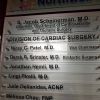- 1. What Is a Silent Heart Attack?
- 2. How Silent Heart Attacks Differ from Visible Attacks
- 3. Subtle Warning Signs of a Silent Heart Attack
- 4. Risk Factors for Silent Heart Attacks
- 5. What to Do If You Suspect a Silent Heart Attack
1. What Is a Silent Heart Attack?
A silent heart attack, also known as an “asymptomatic” heart attack, occurs when a person experiences a heart attack without the typical chest pain or noticeable symptoms commonly associated with heart attacks. This type of heart attack often goes undetected because the person may not feel the usual intense pain that signals a heart problem.
Despite the absence of severe symptoms, a silent heart attack still causes damage to the heart muscle and can lead to long-term health complications, including an increased risk of future heart problems. The silent nature of these attacks makes them particularly dangerous, as individuals may not seek treatment in time to prevent further harm.

2. How Silent Heart Attacks Differ from Visible Attacks
Unlike a typical heart attack, which is often characterized by intense chest pain, shortness of breath, nausea, or pain in the left arm, a silent heart attack may have no noticeable symptoms, or only mild ones. In some cases, people might mistake the symptoms for something less serious, such as indigestion or muscle soreness.
A visible heart attack typically sends the body clear distress signals, prompting the person to seek emergency medical help. In contrast, a silent heart attack may go unnoticed, leading to a delay in treatment and possibly worsening the damage to the heart. This is why it’s important to recognize and understand the subtler signs that might indicate a silent heart attack.
Atlanta Heart Specialists
atlanta heart specialists
4375 Johns Creek Pkwy #350, Suwanee, GA 30024, USA

3. Subtle Warning Signs of a Silent Heart Attack
While a silent heart attack may not cause the dramatic symptoms of a typical heart attack, there are still subtle warning signs that can indicate heart trouble. It’s important to be aware of these symptoms, as they might go unnoticed but still signal a serious health issue.
1. Unexplained Fatigue
One of the most common subtle signs of a silent heart attack is unexplained fatigue. If you suddenly feel unusually tired or lack energy for no clear reason, it could indicate that your heart is not functioning optimally. This type of fatigue may be gradual or persistent and may be mistaken for everyday exhaustion.
2. Mild Chest Discomfort
Instead of the crushing chest pain often associated with heart attacks, silent heart attacks may cause mild discomfort or pressure in the chest. This can sometimes be mistaken for heartburn or muscle soreness, leading individuals to overlook it.
3. Shortness of Breath
If you experience shortness of breath during normal activities or while resting, it may be a sign of heart stress. Although this symptom can also be caused by other conditions, it should not be ignored, especially if it occurs in conjunction with other subtle signs.
4. Mild Pain or Discomfort in the Arms, Neck, or Back
In some cases, a silent heart attack can cause mild discomfort in the left arm, neck, or back. This pain is usually not as intense as the sharp pain that typically accompanies a heart attack, but it can still be a sign of heart problems.
5. Lightheadedness or Dizziness
Dizziness or lightheadedness, especially when accompanied by other symptoms like chest discomfort or shortness of breath, can signal a heart issue. Although dizziness is often associated with other causes, it should be taken seriously if it happens frequently or suddenly.
4. Risk Factors for Silent Heart Attacks
Certain individuals are at higher risk for silent heart attacks due to underlying health conditions or lifestyle factors. Understanding these risk factors can help you take steps to prevent a heart attack, even if you don’t experience noticeable symptoms.
1. Age
As people age, their risk for heart disease increases, and this includes the risk of silent heart attacks. Older adults, particularly those over 65, are more likely to experience heart attacks without the typical symptoms.
2. Diabetes
Diabetes is a significant risk factor for silent heart attacks. High blood sugar levels can damage blood vessels and nerves, making it more difficult for individuals with diabetes to recognize the symptoms of a heart attack.
3. High Blood Pressure
High blood pressure, or hypertension, is another risk factor. Over time, high blood pressure can cause damage to the arteries, leading to an increased likelihood of heart attacks, including silent ones.
4. High Cholesterol
Having high cholesterol levels can lead to plaque buildup in the arteries, narrowing the blood vessels and increasing the risk of a heart attack. Silent heart attacks are more common in individuals with elevated cholesterol levels.
5. Smoking
Smoking damages blood vessels and reduces oxygen flow to the heart, which significantly increases the risk of heart disease and silent heart attacks. Quitting smoking is one of the most effective ways to reduce this risk.
5. What to Do If You Suspect a Silent Heart Attack
If you believe you may have experienced a silent heart attack, it’s important to seek medical attention as soon as possible, even if your symptoms seem mild. Early intervention can help prevent further damage to the heart and reduce the risk of future heart problems.
1. See a Doctor for a Full Evaluation
Consult with your healthcare provider if you have any concerns about heart health. They may recommend tests such as an EKG or blood work to evaluate the health of your heart. Even if you’re unsure, it’s better to err on the side of caution when it comes to your heart health.
2. Make Lifestyle Changes
Whether or not you’ve had a silent heart attack, adopting a heart-healthy lifestyle is crucial. This includes eating a balanced diet, exercising regularly, managing stress, quitting smoking, and limiting alcohol consumption. These changes can help reduce your risk of future heart problems.
3. Take Medications as Prescribed
If your doctor prescribes medication to manage cholesterol, blood pressure, or other risk factors, be sure to follow their instructions carefully. Taking the right medications can significantly reduce the risk of future heart attacks, including silent ones.
At HeartCare Hub, we offer a variety of resources, products, and services designed to support your heart health. If you're looking to improve your lifestyle and manage risk factors, explore our offerings to find the best solutions for you.





















Deborah Heart and Lung Center
deborah heart and lung center
200 Trenton Rd, Browns Mills, NJ 08015, USA